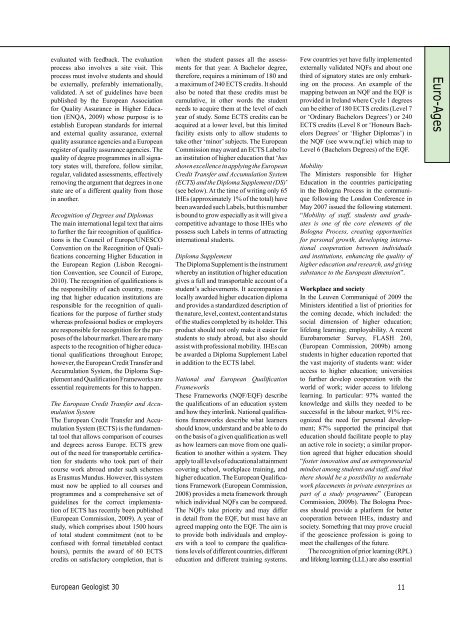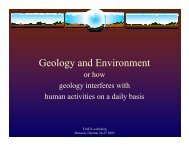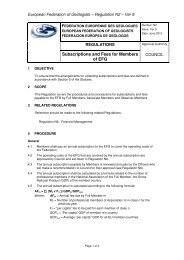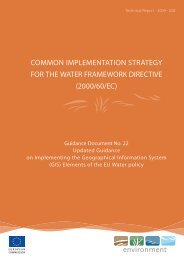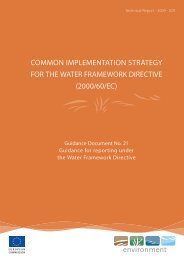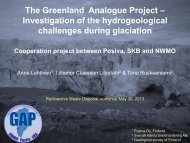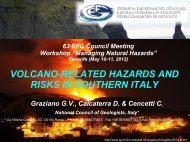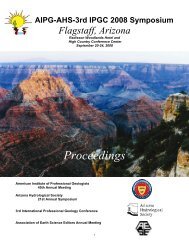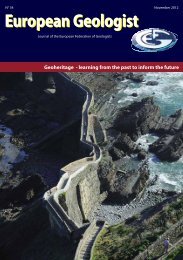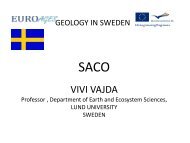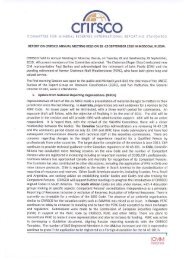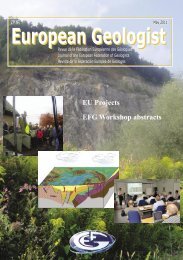EGM 30 download.pdf - European Federation of Geologists
EGM 30 download.pdf - European Federation of Geologists
EGM 30 download.pdf - European Federation of Geologists
Create successful ePaper yourself
Turn your PDF publications into a flip-book with our unique Google optimized e-Paper software.
evaluated with feedback. The evaluationprocess also involves a site visit. Thisprocess must involve students and shouldbe externally, preferably internationally,validated. A set <strong>of</strong> guidelines have beenpublished by the <strong>European</strong> Associationfor Quality Assurance in Higher Education(ENQA, 2009) whose purpose is toestablish <strong>European</strong> standards for internaland external quality assurance, externalquality assurance agencies and a <strong>European</strong>register <strong>of</strong> quality assurance agencies. Thequality <strong>of</strong> degree programmes in all signatorystates will, therefore, follow similar,regular, validated assessments, effectivelyremoving the argument that degrees in onestate are <strong>of</strong> a different quality from thosein another.Recognition <strong>of</strong> Degrees and DiplomasThe main international legal text that aimsto further the fair recognition <strong>of</strong> qualificationsis the Council <strong>of</strong> Europe/UNESCOConvention on the Recognition <strong>of</strong> Qualificationsconcerning Higher Education inthe <strong>European</strong> Region (Lisbon RecognitionConvention, see Council <strong>of</strong> Europe,2010). The recognition <strong>of</strong> qualifications isthe responsibility <strong>of</strong> each country, meaningthat higher education institutions areresponsible for the recognition <strong>of</strong> qualificationsfor the purpose <strong>of</strong> further studywhereas pr<strong>of</strong>essional bodies or employersare responsible for recognition for the purposes<strong>of</strong> the labour market. There are manyaspects to the recognition <strong>of</strong> higher educationalqualifications throughout Europe;however, the <strong>European</strong> Credit Transfer andAccumulation System, the Diploma Supplementand Qualification Frameworks areessential requirements for this to happen.The <strong>European</strong> Credit Transfer and AccumulationSystemThe <strong>European</strong> Credit Transfer and AccumulationSystem (ECTS) is the fundamentaltool that allows comparison <strong>of</strong> coursesand degrees across Europe. ECTS grewout <strong>of</strong> the need for transportable certificationfor students who took part <strong>of</strong> theircourse work abroad under such schemesas Erasmus Mundus. However, this systemmust now be applied to all courses andprogrammes and a comprehensive set <strong>of</strong>guidelines for the correct implementation<strong>of</strong> ECTS has recently been published(<strong>European</strong> Commission, 2009). A year <strong>of</strong>study, which comprises about 1500 hours<strong>of</strong> total student commitment (not to beconfused with formal timetabled contacthours), permits the award <strong>of</strong> 60 ECTScredits on satisfactory completion, that iswhen the student passes all the assessmentsfor that year. A Bachelor degree,therefore, requires a minimum <strong>of</strong> 180 anda maximum <strong>of</strong> 240 ECTS credits. It shouldalso be noted that these credits must becumulative, in other words the studentneeds to acquire them at the level <strong>of</strong> eachyear <strong>of</strong> study. Some ECTS credits can beacquired at a lower level, but this limitedfacility exists only to allow students totake other ‘minor’ subjects. The <strong>European</strong>Commission may award an ECTS Label toan institution <strong>of</strong> higher education that ‘hasshown excellence in applying the <strong>European</strong>Credit Transfer and Accumulation System(ECTS) and the Diploma Supplement (DS)’(see below). At the time <strong>of</strong> writing only 65IHEs (approximately 1% <strong>of</strong> the total) havebeen awarded such Labels, but this numberis bound to grow especially as it will give acompetitive advantage to those IHEs whopossess such Labels in terms <strong>of</strong> attractinginternational students.Diploma SupplementThe Diploma Supplement is the instrumentwhereby an institution <strong>of</strong> higher educationgives a full and transportable account <strong>of</strong> astudent’s achievements. It accompanies alocally awarded higher education diplomaand provides a standardized description <strong>of</strong>the nature, level, context, content and status<strong>of</strong> the studies completed by its holder. Thisproduct should not only make it easier forstudents to study abroad, but also shouldassist with pr<strong>of</strong>essional mobility. IHEs canbe awarded a Diploma Supplement Labelin addition to the ECTS label.National and <strong>European</strong> QualificationFrameworksThese Frameworks (NQF/EQF) describethe qualifications <strong>of</strong> an education systemand how they interlink. National qualificationsframeworks describe what learnersshould know, understand and be able to doon the basis <strong>of</strong> a given qualification as wellas how learners can move from one qualificationto another within a system. Theyapply to all levels <strong>of</strong> educational attainmentcovering school, workplace training, andhigher education. The <strong>European</strong> QualificationsFramework (<strong>European</strong> Commission,2008) provides a meta framework throughwhich individual NQFs can be compared.The NQFs take priority and may differin detail from the EQF, but must have anagreed mapping onto the EQF. The aim isto provide both individuals and employerswith a tool to compare the qualificationslevels <strong>of</strong> different countries, differenteducation and different training systems.Few countries yet have fully implementedexternally validated NQFs and about onethird <strong>of</strong> signatory states are only embarkingon the process. An example <strong>of</strong> themapping between an NQF and the EQF isprovided in Ireland where Cycle 1 degreescan be either <strong>of</strong> 180 ECTS credits (Level 7or ‘Ordinary Bachelors Degrees’) or 240ECTS credits (Level 8 or ‘Honours BachelorsDegrees’ or ‘Higher Diplomas’) inthe NQF (see www.nqf.ie) which map toLevel 6 (Bachelors Degrees) <strong>of</strong> the EQF.MobilityThe Ministers responsible for HigherEducation in the countries participatingin the Bologna Process in the communiquefollowing the London Conference inMay 2007 issued the following statement.“Mobility <strong>of</strong> staff, students and graduatesis one <strong>of</strong> the core elements <strong>of</strong> theBologna Process, creating opportunitiesfor personal growth, developing internationalcooperation between individualsand institutions, enhancing the quality <strong>of</strong>higher education and research, and givingsubstance to the <strong>European</strong> dimension”.Workplace and societyIn the Leuven Communiqué <strong>of</strong> 2009 theMinisters identified a list <strong>of</strong> priorities forthe coming decade, which included: thesocial dimension <strong>of</strong> higher education;lifelong learning; employability. A recentEurobarometer Survey, FLASH 260,(<strong>European</strong> Commission, 2009b) amongstudents in higher education reported thatthe vast majority <strong>of</strong> students want: wideraccess to higher education; universitiesto further develop cooperation with theworld <strong>of</strong> work; wider access to lifelonglearning. In particular: 97% wanted theknowledge and skills they needed to besuccessful in the labour market, 91% recognizedthe need for personal development;87% supported the principal thateducation should facilitate people to playan active role in society; a similar proportionagreed that higher education should“foster innovation and an entrepreneurialmindset among students and staff, and thatthere should be a possibility to undertakework placements in private enterprises aspart <strong>of</strong> a study programme” (<strong>European</strong>Commission, 2009b). The Bologna Processshould provide a platform for bettercooperation between IHEs, industry andsociety. Something that may prove crucialif the geoscience pr<strong>of</strong>ession is going tomeet the challenges <strong>of</strong> the future.The recognition <strong>of</strong> prior learning (RPL)and lifelong learning (LLL) are also essentialEuro-Ages<strong>European</strong> Geologist <strong>30</strong>11


